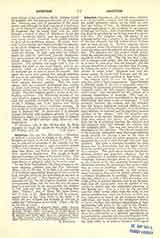

Adoption.—IN THE OLD TESTAMENT.—Adoption, as defined in canon law, is foreign to the Bible. The incidents in Exod., ii, 10, and Esther, ii, 7, ii, 15, cannot be adduced as examples to the contrary, for the original text contains but a vague expression instead of the word “adopted”, and the context merely implies that Moses and Esther were the proteges of their respective benefactors. The people of Israel enjoyed a similar privilege at the hands of God. The facts mentioned in Gen., xlviii, 5, however, bear close resemblance to adoption taken in its strict sense.
IN THE NEW TESTAMENT.—St. Paul introduces the word adoption (uiothesia) into the New Testament (Rom., viii, 15, 23; Gal., iv, 5; Eph., i, 5), and applies it to a special relationship (sonship) of man towards God, brought about by the indwelling in our soul of the “Spirit of God“. This Spirit gives us a new, a supernatural life, the life of grace, together with the consciousness (Rom., viii, 16) that this new life comes from God and that we are consequently the children of God, endowed with the privilege of calling Him Abba, “Father”, and of being His heirs (Rom., viii, 17; Gal., iv, 6). This adoption will be consummated when to the “first fruits of the Spirit“, of which our soul is made the recipient in this life, is added the “redemption of our body” (Rom., viii, 23) in the life to come.
E. HEINLEIN

